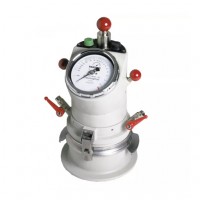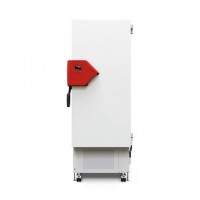Soil Compaction Control
via In-place Stiffness & Modulus
- Humboldt - GeoGauge H-4140
ASTM Standard Test Method D 6758
The GeoGauge is an advanced soil compaction and material strength process control instrument that enables construction of higher quality and lower cost roadways and highways.
Pavement components and layers can now be compacted to relevant engineering properties taken directly from design specifications. Compacting and monitoring the soil directly to design requirements of structural layer stiffness or material modulus during the construction process establishes the means to effectively control structural uniformity, strength and deflection, as well as enabling the monitoring and control of the construction quality of various materials. This leads to better smoothness and longer lasting pavement surfaces at lower cost.
Features include
- Dynamically measures in-place engineering properties using structural layer stiffness, MN/m (klbf/in) and Young's Modulus of a material, MPa (kpsi)
- In-place QC/QA links compaction and material performance directly to design requirements while advancing Mechanistic-Empirical Pavement Design
- Enables maximum lift stiffness with minimum compactive effort
- Facilitates uniform stress transmission and distribution from pavement to subgrade resulting in longer pavement life, reduced maintenance costs and longer lasting surface smoothness.
- Enables reduced structural variability in construction
- In-place QC/QA of the strength gain of stabilized materials
- Data base development supporting MechanisticEmpirical Design and performance specifications
- Portable, fast, simple, reliable, non-invasive and non-nuclear
- Other compaction applications include: lime, cement, fly-ash and polymer stabilized materials, cement-treated and rehabilitated bases, large particle aggregate bases, as well as underground utility backfills
The GeoGauge can be used to control the compaction process by the using the design engineering properties of stiffness and modulus to gain a more accurate view of the state of compaction. Stiffness and modulus can reveal weak and/or problem areas in construction that density readings can not determine. The GeoGauge can help you better control the quality of your construction by improving uniform layer properties for good stress transmission and distribution from surface to subgrade. This results in better quality construction, which results in longer pavement life, longer lasting surface smoothness, reduced maintenance and less chance of pavement failures.
The GeoGauge works by applying steady-state sinusoidal loadings onto the soil's surface and measuring the resulting displacement. This dynamic technology simulates real in-use conditions. The GeoGauge is the only hand portable gauge available to provide the required simplicity, speed and precision to directly measure in-place engineering properties and do so without delay, keeping up with and facilitating the construction progress. The GeoGauge supports and directly links the in-place engineering properties of compacted materials with Mechanistic-Empirical Design for effective QC/QA. Successful control of compaction creates a quality functional structure with the desired engineering properties for the application and life intended.
The GeoGauge has been established as an in-place index of CBR and resilient modulus. In addition, the GeoGauge has shown to be a substitute for FWD, LFWD, DCP and plate load tests. Having the distinct advantages of speed, simplicity and not penetrating the soil, the GeoGauge enables broader and more effective QC/QA based on soil characterizations normally established by FWD, LFWD, DCP, PLT and CBR.
Applications include subgrade, subbase, base, monitoring the strength gain of lime, cement, fly-ash and polymer stabilized materials, monitoring the re-compaction of underground utility backfills to previous properties matching surrounding undisturbed materials, monitoring the compaction of asphalt and cold in-place recycling to peak properties to prevent wasted effort and damaging over-compaction.
Stiffness
A layer's resistance to deflection or bending (structural property). A key determination of loading capacity.
Young's modulus
A material's resistance to change in shape in direction of stress (material property). A determination of material's strength.
Applicable standards
Meets ASTM Standard Test Method D 6758
| Ordering Information | |
| H-4140 — GeoGauge — Stiffness/Modulus Gauge | |
| Includes | carrying case, batteries and manual |
| Optional Accessories | |
| H-4140.12 | Infrared Interface & Serial Port Adapter ith Sofware Templace (PC only) |
| H-4140.20 | Verifier Mass (verifies GeoGauge operation) |
| Layer Stiffness | 17 to 400 klbf/in (3 to 70 MN/m) | |
| Youn's Modulus (in-place) | 4 to 90 kpsi (26 to 610 MPa) | |
| Measure Depth | 9 to 12 inches (230 to 310 mm) | |
| Measure Duration | 75 seconds | |
| Power | Six D-Cell Batteries (1000 to 1500 measurements) | |
| Dimensions | Gauge Only | 11" dia x 10.5" high (280mm x 270mm) |
| With Case | 18.5" x 16.5" x 13" (470 x 420 x 330 mm) | |
| Net Weight | Gauge Only | 22 lbs (10kg) |
| With Case | 34 lbs (15.5 kg) | |
| Shipping Weight | 39 lbs (17.7 kg) | |
Specifications may change without notice U.S. Patent #6,604,432



Do you have a question?
min 10 ch